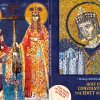Mr. Milenkovich's 2010-11 season includes performances with Belgrade Philharmonic under the baton of Sir Neville Marriner, Radio Television Orchestra of Slovenia under conductor En Shao, Adana and Izmir Symphony Orchestras with Ibrahim Yazici. This season also features collaboration with lutist Edin Karamazov that includes extensive tour of the Balkans, as well as CD recording and appearance at the Guitar Art Festival in Belgrade. As a musician of broad stylistic interests, most recent project is intense collaboration with guitarist Vlatko Stefanovski and his trio, with Mr. Milenkovich exploring the realm of improvisation and acustic-electric violin. Other performances this season will include the world premiere of Rudolf Haken's Violin Concerto written for Mr. Milenkovich at the NOMUS Music Festival in Novi Sad, Serbia.
Mr. Milenkovich is a violinist who is recognized internationally for both exceptional artistry and his lifelong commitment to humanitarianism. His orchestral appearances include performances with the Berlin Symphony Orchestra, the Helsinki Philharmonic, the Belgrade Philharmonic, the Orchestra of Radio-France, the Bolshoi Theatre Orchestra, the National Orchestra of Belgium, the Orpheus Chamber Orchestra, the Aspen Chamber Symphony, the Indianapolis Symphony Orchestra, the Mexico State Symphony, the Orquestra Sinfonica de Estado de Sao Paolo in Brazil, and the Melbourne and Queensland Symphonies in Australia. An avid chamber musician, he performs regularly in the Jupiter Chamber Music Series in New York City and is the founding member of Corinthian Piano trio, as well as recently joining the Formosa Quartet.
Mr. Milenkovich is deeply committed to international humanitarian causes. Most recently, he received the 2003 "Most Humane Person" award in Belgrade, Serbia. He also participated in a number of gala concerts under the auspices of UNESCO in Paris with such artists as Placido Domingo, Lorin Maazel, Alexis Weissenberg, and Sir Yehudi Menuhin.
Mr. Milenkovich started his career at a very young age, performing with his first orchestra at the age of 6, performing his 1000th concert at age 16. By age 17, he was a prizewinner in the International Violin Competition of Indianapolis (USA), the Queen Elisabeth Competition (Belgium), Hannover Violin Competition (Germany), Tibor Varga Competition (Switzerland), Rodolfo Lipizer Competition (Italy), Paganini Competition (Italy), Ludwig Spohr Competition (Germany), and the Yehudi Menuhin Competition (England).
Mr. Milenkovich's discography includes four commercial releases on the Italian label Dynamic and numerous recordings for the Yugoslavian label, PGP. He taught in collaboration with Itzhak Perlman at the Juilliard School before accepting his current position as an Associate Professor of Violin at the University of Illinois at Urbana-Champaign.





